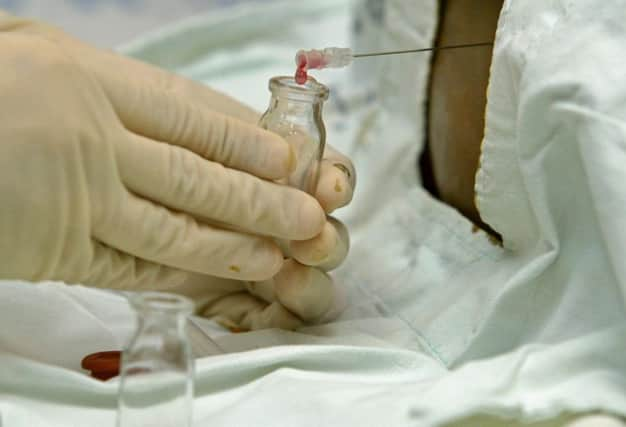Scientists hail find as ‘major milestone’ in tackling blood cancer


Scientists from Edinburgh University discovered that two genes, known as Hif-1alpha and Hif-2alpha, could stop the formation of leukemic stem cells in acute myeloid leukaemia (AML), which occurs when production of new blood cells in the bone marrow is faulty.
The team found that blocking the development of these molecules actually accelerated the development of leukaemia, in contrast to previous findings.
Advertisement
Hide AdAdvertisement
Hide AdThe study, published in the Journal of Experimental Medicine, suggested that promoting the activity of these two molecules could help to treat AML or stop the disease from recurring after chemotherapy.
Lead author Professor Kamil R Kranc, Cancer Research UK asenior fellow at the MRC Centre for Regenerative Medicine in Edinburgh, said: “Our discovery that Hif-1alpha and Hif-2alpha molecules act together to stop leukaemia development is a major milestone in our efforts to combat leukaemia.
“We now intend to harness this knowledge to develop curative therapies that eliminate leukaemic stem cells, which are the underlying cause of AML.”
More than 2,400 people are diagnosed with AML in the UK each year, and fewer than one in five will survive longer than five years.
Chemotherapy drugs can help to eliminate leukaemia cells but have no effect on leukemic stem cells that cause the disease, which means the disease sometimes relapses.
Dr Milica Vukovic, one of the authors based at Edinburgh University, said: “Leukaemia is an umbrella term for a vast number of very complicated and different diseases. Given our findings implicating Hif-1alpha and Hif-2alpha as tumour suppressors in AML, it would be very interesting to investigate their roles in other leukaemias.”
The findings were welcomed Dr Matt Kaiser, head of research at Bloodwise charity, who said long term survival rates for leukaemia were still “shockingly low”.
Dr Kaiser added: “It is very early days, but this promising research suggests a way drugs could be designed to eliminate all of the leukaemia cells and stop the cancer returning.
“The next step will be to develop drugs that exploit these features of leukaemia stem cells towards testing them in actual patients.”